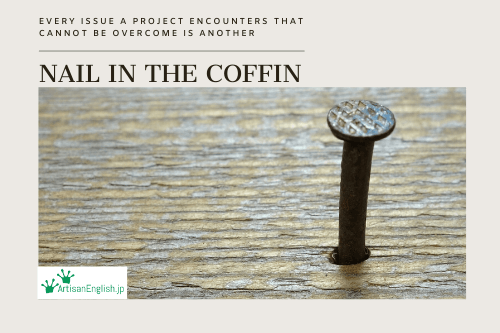
YouTube / iTunes / Spotify / Radio Public / Pocket Casts / Google Podcasts / Breaker / Overcast
Listen to ArtisanEnglish.jp posts & lesson intros here.
Idiom: A nail in the coffin
Massive failures are composed of many smaller failures.
If we go back and examine why something failed, we will find many small reasons that accumulated until the thing was destroyed.
In the idiom, a nail in the coffin, ‘a nail’ is a minor failure and ‘the coffin’ is the major one.
Have you ever known someone whose life was a slow-motion train wreck?
It’s evident to you that they are destroying their life one action at a time.
First, someone tries illegal drugs and gets hooked.
Then, they become interested in harder drugs to increase the intensity of the high.
Each little escalation is a nail in the coffin if you follow my meaning.
Enjoy learning new things? Sign up to receive knowledge in your inbox Thursday – Monday at 7:00 pm.
Eventually, the drug habit begins to negatively affect their personal life, and they spiral downwards (seeing as how we’re talking about nails in coffins, I did not choose ‘downwards’ by accident).
They show up late for work (a nail), lose their job (another nail), and their spouse leaves them (yet another nail in the coffin).
Finally, if no one can intervene and stop them from crashing completely, they are either sentenced to a long term in prison or found dead under a bridge somewhere with a needle sticking out of their arm.
You see, each tiny mistake becomes a nail in the coffin, which eventually leads to complete and utter devastation and failure.
The moral here is if you can prevent small failures from accumulating, you can avoid the big ones occurring.
It’s called learning from your mistakes.
Flesch-Kincaid Readability Test
This post is understandable by someone with at least an 8th-grade education (age 13 – 14).
On the Flesch-Kincaid reading-ease test, this post scores 64.
The easier a passage is to read, the higher the score on a scale of 0 – 100.

